-
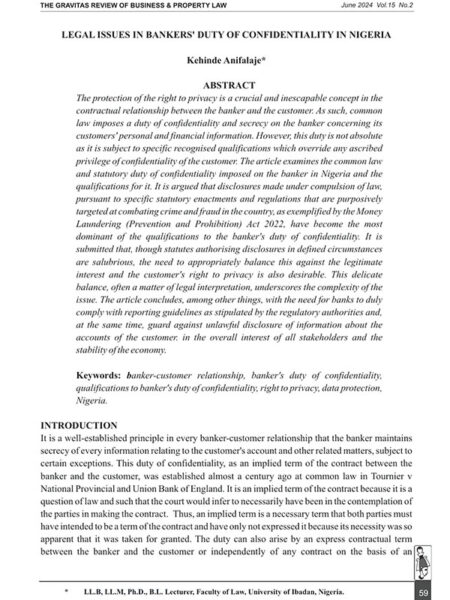
Legal Issues in Bankers’ Duty of Confidentiality in Nigeria
0₦2,500.00Dr. Kehinde Anifalaje, in his article, Legal Issues in Bankers’ Duty of Confidentiality in Nigeria, examines the common law and statutory duty of confidentiality imposed on the banker in Nigeria and the qualifications thereto. It is argued that disclosures made under compulsion of law, pursuant to specific statutory enactments and regulations that are purposively targeted at combating crime and fraud in the country, as exemplified by the Money Laundering (Prevention and Prohibition) Act 2022, have become the most dominant of the qualifications to the banker’s duty of confidentiality. Anifalaje submits that, though statutes authorising disclosures in defined circumstances are salubrious, the need to appropriately balance this against the legitimate interest and the right to privacy of the customer is also desirable. Anifalaje concludes, inter alia, with the need for banks to duly comply with reporting guidelines as stipulated by the regulatory authorities and at the same time guard against unlawful disclosure of information pertaining to the accounts of the customer in the overall interest of all stakeholders and the stability of the economy.
-
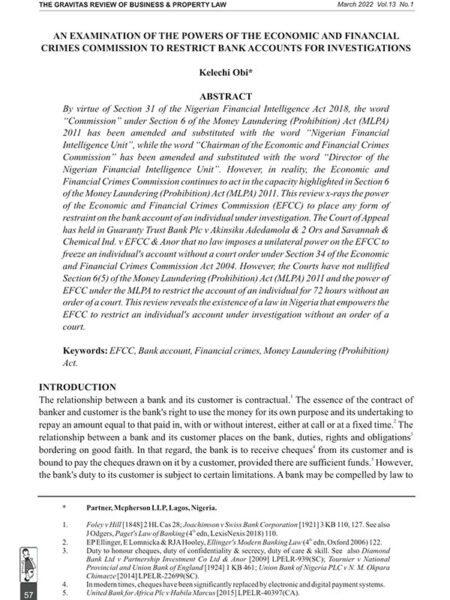
An Examination of the Powers of the Economic and Financial Crimes Commission to Restrict Bank Accounts for Investigations
0₦2,500.00Kelechi Obi, Partner, McPherson LLP, Lagos, Nigeria, in his article, An Examination of the Powers of the Economic and Financial Crimes Commission to Restrict Bank Accounts for Investigations, considers the provisions of the Nigerian Financial Intelligence Act 2018, the Money Laundering (Prohibition) Act 2011 (as amended), the Economic and Financial Crimes Commission Act 2004 in x-raying the powers of the EFCC to place restraint on the bank account of an individual under investigation. Kelechi reviews two crucial decisions of the Court of Appeal on the issue and concludes that there is a law that empowers the EFCC to restrict an individual’s account under investigation without an order of a court.
-
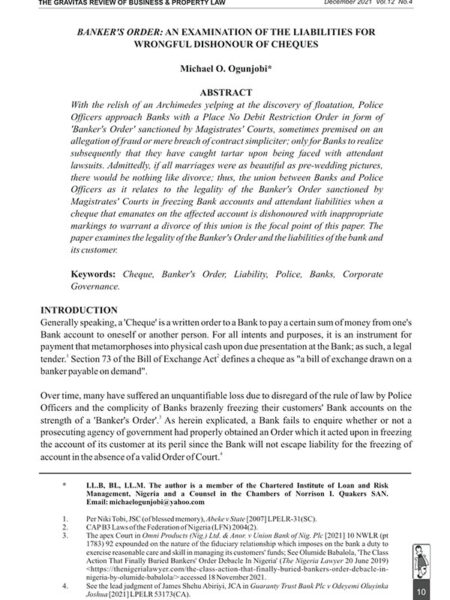
Banker’s Order: An Examination of the Liabilities for Wrongful Dishonour of Cheques
0₦2,500.00Michael Ogunjobi, of the Chambers of Norrison I. Quakers SAN, in his article, Banker’s Order: An Examination of the Liabilities for Wrongful Dishonour of Cheques, flays the practice by which Police Officers ‘freeze’ bank accounts acting on the so-called Banker’s Order’ issued by Magistrates. Ogunjobi examines the legality of the Banker’s Order, the bank’s customer’s liability for a dishonoured cheque and the reliefs the customer may pursue against the bank for a dishonoured cheque.
-
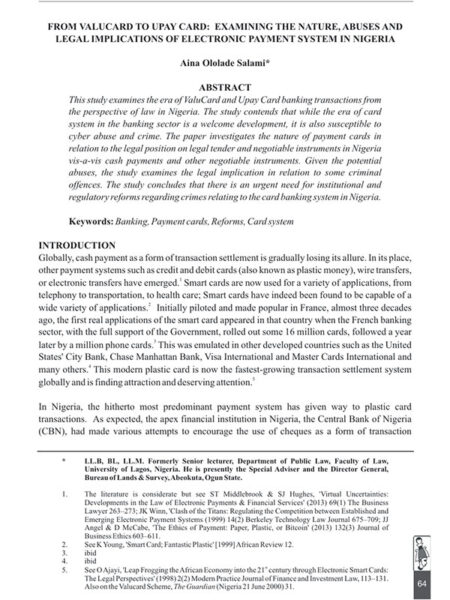
From Valucard to Upay Card: Examining the Nature, Abuses and Legal Implications of Payment Cards in Nigeria
0₦2,500.00Aina Salami, formerly Senior lecturer, Department of Public Law, University of Lagos and presently the Director-General, Bureau of Lands & Survey Ogun State, in his article, From Valucard to Upay Card: Examining the Nature, Abuses and Legal Implications of Payment Cards in Nigeria, examines the legal nature, types and abuses of payment cards in Nigeria. Given the potential abuses of card transactions, Salami explores some criminal offences relating to card transaction and advocates urgent institutional and regulatory reforms to accommodate global trends in payment systems.
-
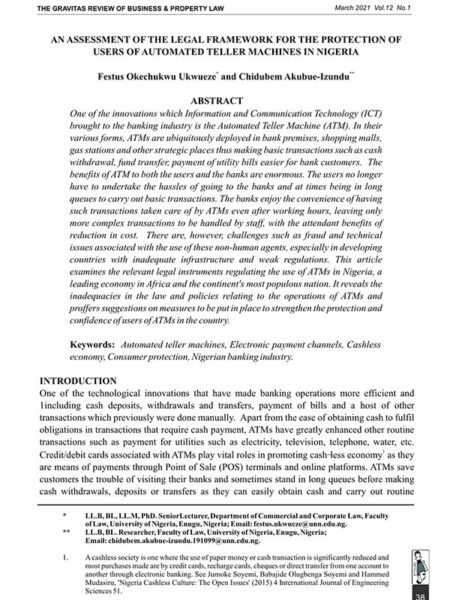
An Assessment of the Legal Framework for the Protection of Users of Automated Teller Machines in Nigeria
0₦2,500.00Dr Festus Ukwueze and Chidubem Akubue-Izundu of the Faculty of Law University of Nigeria Enugu Nigeria in their article, An Assessment of the Legal Framework for the Protection of Users of Automated Teller Machines in Nigeria, note the convenience and benefits of ATMs: faster cash withdrawals, easy fund transfer, convenient payment of utility bills. There are, however, challenges, mainly fraud and technical issues associated with the use of these non-human agents. Dr Ukwueze and Akubue-Izundu comprehensively review the relevant legal instruments regulating the use of ATMs in Nigeria. They posit that the laws and policies relating to ATMs’ operations are inadequate and proffer suggestions on measures to be put in place to strengthen the protection and confidence of users of ATMs in the country.
-
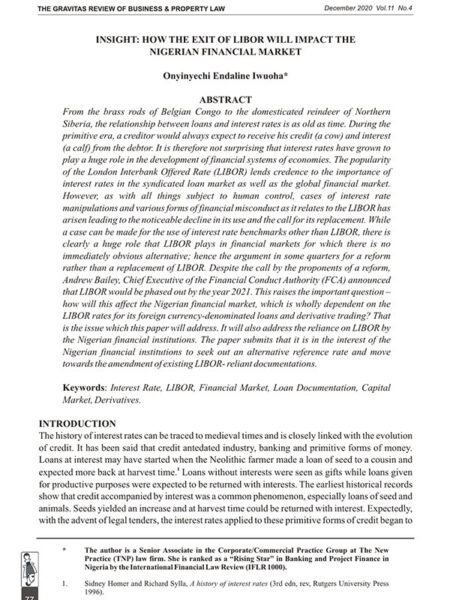
Insight: How the Exit of LIBOR Will Impact the Nigerian Financial Market
0₦2,500.00Onyinyechi Iwuoha, Senior Associate at the TNP Law Firm in her article, Insight: How the Exit of LIBOR Will Impact the Nigerian Financial Market, notes the popularity of the London Interbank Offered Rate (LIBOR) in financial markets worldwide. With the impending phasing out of LIBOR in 2021 by the (UK) Financial Conduct Authority due to what became known as the ‘LIBOR Scandal’, Onyinyenchi addresses how the exit of LIBOR would affect the Nigerian financial market which is wholly dependent on the LIBOR rates for its foreign currency-denominated loans and derivative trading; what alternative reference rates there are, and the amendment of existing LIBOR-reliant documentations.
-
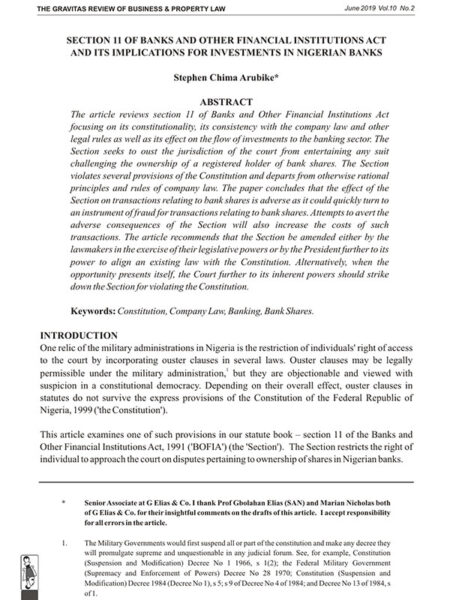
Section 11 of Banks and Other Financial Institutions Act and Its Implications for Investments in Nigerian Banks
0₦2,500.00Stephen Arubike, Senior Associate at G Elias & Co., Lagos Nigeria in his article, Section 11 of Banks and Other Financial Institutions Act and its implications for Investments in Nigerian Banks, examines the implication of section 11 BOFIA which ousts the jurisdiction of the courts in any suit challenging the ownership of a registered holder of bank shares. Stephen considers several decided cases and scholarly on the concludes that the section violates several provisions of the 1999 Constitution of Nigeria and departs from rational principles and rules of company law. He concludes that the section could have negative consequences on dealings and transactions in bank shares and ought to be struck down by the courts or amended by the parliament.
-
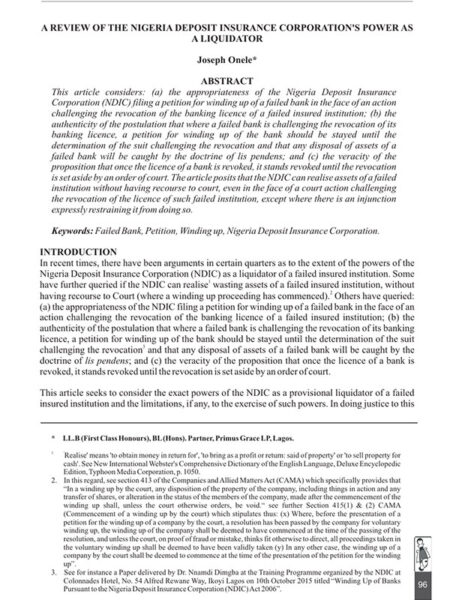
A Review of the Nigeria Deposit Insurance Corporation’s Power as a Liquidator
0₦2,500.00Joseph Onele Partner, Primus Grace LP, in his article, A Review of the Nigeria Deposit Insurance Corporation’s Power as a Liquidator considers the appropriateness of the Nigeria Deposit Insurance Corporation filing a petition for winding up of a failed bank in the face of an action challenging the revocation of the banking licence of a failed insured institution; the authenticity of the postulation that where a failed bank is challenging the revocation of its banking licence, a petition for winding up of the bank should be stayed until the determination of the suit challenging the revocation and the veracity of the proposition that once the licence of a bank is revoked, it stands revoked until the revocation is set aside by an order of court.
-
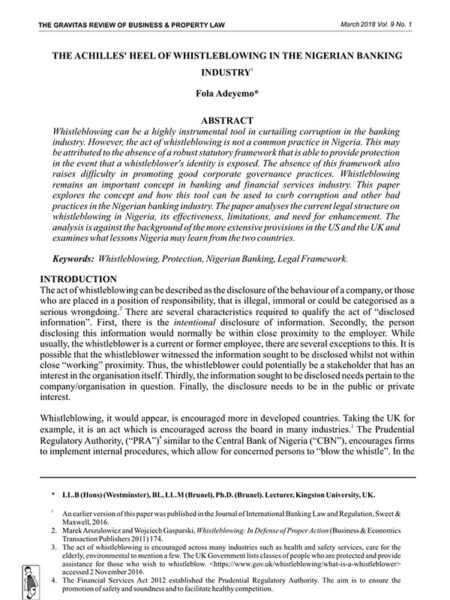
The Achilles’ Heel of Whistleblowing in the Nigerian Banking Industry
0₦2,500.00Dr. Fola Adeyemo, Lecturer, Kingston University UK in her paper, “The Achilles’ Heel of Whistleblowing in the Nigerian Banking Industry”,laments the absence of a robust statutory framework for protection of whistleblowers in Nigeria. She analyses the current legal structure on whistleblowing in Nigeria with emphasis on the banking industry. The analysis is against the background of the more extensive provisions in the US and the UK. She concludes with the lessons Nigeria can learn from the two countries.
-
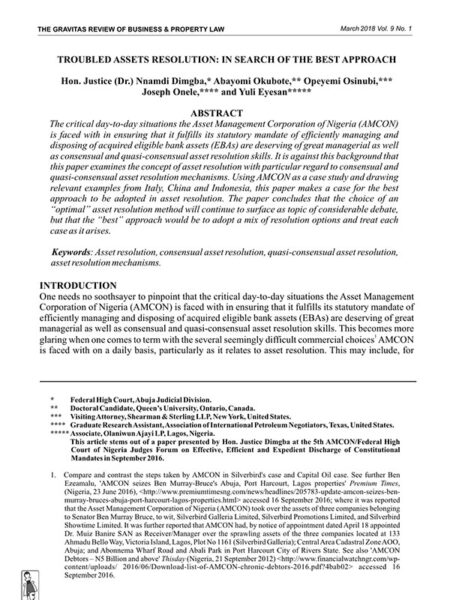
Troubled Assets Resolution in Search of the Best Approach
0₦2,500.00Hon. Justice (Dr) Nnamdi Dimgba of the Federal High Court Abuja, and the quartet of Abayomi Okubote, Opeyemi Osinubi, Joseph Onele and Yuli Eyesan in their paper, “Troubled Assets Resolution-In Search of the Best Approach”,examine the concept of asset resolution with particular regard to consensual and quasi-consensual resolution mechanisms. Using AMCON as a case study, and analysing its mandate to manage and dispose of acquired eligible banks assets (EBAs), and drawing relevant examples from Italy, China and Indonesia, they consider adversarial recovery methods, and non-adversarial consensual or quasi-consensual resolution options by which the ‘toxic assets bank’ may fulfill its mandate. They conclude that the “best” approach would be to adopt a mix of resolution options and treat each case as it arises.
-
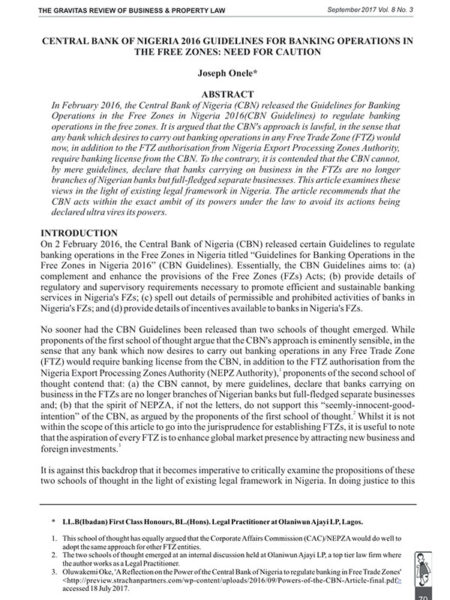
Central Bank of Nigeria 2016 Guidelines for Banking Operations in the Free Zones: Need for Caution
0₦2,500.00Joseph Onele, Legal Practitioner, Olaniwun Ajayi LP in his article “Central Bank of Nigeria 2016 Guidelines for Banking Operations in The Free Zones: Need for Caution”, analyses the CBN Guidelines vis-à-vis the provisions of the Bank and Other Financial Institutions Act (BOFIA), and the Nigeria Export Processing Zones Act. Would branches of a bank with valid banking license be able to operate in the free trade zones or would an existing branch of a bank have to become a subsidiary of the parent bank to be able to operate? Can the CBN by its Guidelines extend the frontiers of BOFIA? Onele in his usual inimitable style considers all sides of the argument and urges a need for caution.
-
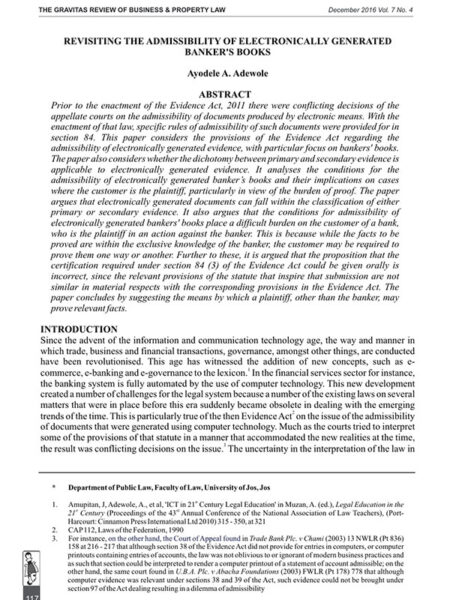
Revisiting the Admissibility of Electronically Generated Banker’s Books
0₦2,500.00Ayodele Adewole of the Department of Public Law, University of Jos in his rivetting article “Revisiting the Admissibility of Electronically Generated Bankers’ Books” analyses the provision of the Evidence Act, 2011 as it relates to the admissibility of electronically generated documents, especially bankers’ books. He considers whether the dichotomy between primary and secondary evidence is applicable to electronically generated evidence. He argues that the requirement for certification under section 84 places a difficult burden on the customer of a bank, who is the plaintiff in an action against the banker and has to prove a fact within the exclusive knowledge to the banker, who generates, stores and has custody of the record. In such a case, the interests of the party seeking to prove, and that of the party against who the document is sought to be proved is not coterminous, thereby resulting in frustration for the party seeking to prove the fact.
The Gravitas Review of Business & Property Law



